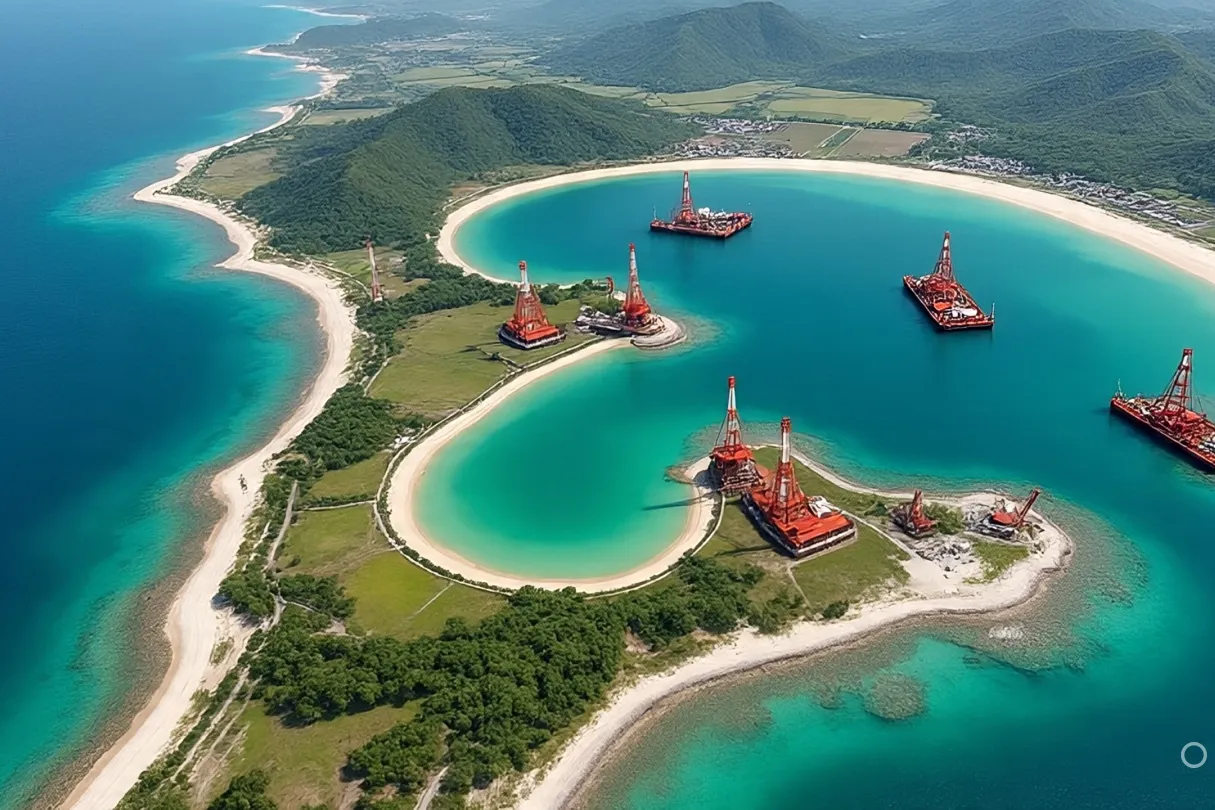The South China Sea: a sprawling expanse of blue, crisscrossed by vital shipping lanes and dotted with contested islands and reefs. It’s a region simmering with geopolitical tension, where overlapping territorial claims and the pursuit of natural resources fuel a constant undercurrent of unease. Amidst this complex landscape, a compelling yet controversial theory has taken root and stubbornly persisted: that Vietnam possesses vast, undisclosed oil reserves within its Exclusive Economic Zone (EEZ), deliberately kept under wraps to avoid further antagonizing its powerful neighbor, China, and escalating the already fraught situation.
This isn’t just a fringe notion whispered in hushed tones. For many observers, particularly within certain economic and political circles, the idea of Vietnam hidden oil reserves offers a tantalizing explanation for the nation’s cautious approach to energy development in the contested waters. It paints a picture of a strategic gambit, a nation sitting on a potential goldmine, choosing restraint over resource exploitation to maintain a fragile peace. But how much truth lies beneath these whispers of untapped riches? What are the historical, economic, and political factors that have allowed this theory to gain such traction? And more importantly, can it withstand scrutiny under the weight of scientific evidence and expert analysis? Let’s delve into the murky depths of this black gold conspiracy.
🧠 The Genesis of Suspicion: Geopolitics and Opacity
The foundation of the Vietnam hidden oil reserves theory is built upon the volatile dynamics of the South China Sea dispute. China’s sweeping claims over almost the entire sea, its assertive actions, and its history of opposing unilateral oil exploration by other claimant states like Vietnam and the Philippines, create a climate of fear and suspicion. Any perceived hesitation or lack of aggressive exploration by Vietnam in its own claimed waters can be easily interpreted through the lens of this geopolitical pressure.
Furthermore, a lack of complete transparency in Vietnam’s energy sector reporting inadvertently fuels speculation. While the state-owned Vietnam Oil and Gas Group (PetroVietnam) provides data on its activities, the level of detail regarding potential future reserves or comprehensive geological surveys isn’t always publicly available. This information gap allows for alternative narratives to flourish, particularly those suggesting a deliberate obfuscation of significant findings.
The historical context of past oil explorations and subsequent tensions with China also plays a crucial role. Incidents where Vietnam’s exploration activities have been met with strong protests and even aggressive actions from Chinese vessels reinforce the idea that large-scale oil extraction could trigger a major crisis. The theory posits that the most logical way to avoid such a confrontation, while still holding onto a valuable long-term asset, would be to quietly confirm the reserves without actively exploiting them on a grand scale.
🧐 Examining the “Evidence”: What Fuels the Belief?
Proponents of the Vietnam hidden oil reserves theory often point to several circumstantial factors as supporting evidence:
⚓ Historical Maritime Claims and Potential
Vietnam has a long-standing claim to significant portions of the South China Sea, predating the current assertive stance of the People’s Republic of China. Its EEZ, as defined under international law, encompasses areas believed to be geologically promising for hydrocarbon deposits. The fact that other nations in the region, within their own claimed territories, have discovered substantial oil and gas reserves leads some to believe that Vietnam’s waters must hold similar, if not greater, potential.
🤫 The Strategy of Strategic Ambiguity
Vietnam’s foreign policy in the South China Sea has often been characterized by a degree of strategic ambiguity. Balancing its desire to assert its sovereignty with the need to maintain economic and political stability in the region, particularly in its relationship with China, requires a delicate approach. Theorists argue that concealing knowledge of vast oil wealth could be a part of this strategy, a trump card to be played at a later, more opportune moment.
💰 The Economic Incentive
If Vietnam were indeed sitting on massive oil reserves, it would represent a transformative opportunity for its economy. It could significantly boost national revenue, fund infrastructure development, and enhance its energy independence. The sheer scale of this potential economic windfall makes the idea of its existence, even if hidden, an appealing prospect for many Vietnamese citizens and observers. In a rapidly developing nation with growing energy demands, the thought of a secret energy lifeline is undeniably attractive.
🚫 Perceived Inaction and Under-Exploration
Compared to some of its neighbors, Vietnam’s large-scale, unilateral oil exploration activities in the most contested areas of its EEZ have appeared relatively limited in recent years, particularly those far from its coastline and unambiguously within its internationally recognized zone. While joint ventures with international partners have occurred, some interpret the absence of aggressive, independent exploration as further evidence of a deliberate holding back, possibly due to the knowledge of reserves that they don’t want to provoke China over.
🗣️ Voices from the Field: Perspectives and Arguments
To gain a deeper understanding, it’s crucial to consider the perspectives of various experts:
📈 Economists: The Lure of Untapped Wealth
Economists acknowledge the immense potential impact of significant oil discoveries on Vietnam’s economy. Such reserves could lead to:
- Increased GDP and export revenue: Transforming Vietnam into a major energy exporter.
- Reduced reliance on imports: Enhancing energy security and saving foreign currency.
- Attraction of foreign investment: In the development and supporting industries.
- Funding for social programs and infrastructure: Leading to significant improvements in quality of life.
However, they also caution that exploiting these resources in a contested environment would come with significant risks, including potential conflict, environmental damage, and the volatility of global oil prices. The economic benefits would need to be carefully weighed against these potential costs.
🌍 Environmentalists: A Double-Edged Sword
Environmental organizations express deep concern over the potential exploitation of new oil reserves in the South China Sea. The region is a biodiversity hotspot, and oil spills or drilling accidents could have devastating and long-lasting consequences for marine ecosystems and coastal communities. They argue that a focus on renewable energy sources is a more sustainable and environmentally responsible path for Vietnam’s energy future, especially given the global push towards decarbonization. The environmental risks associated with drilling in a geopolitically sensitive and potentially unstable area would be significantly amplified.
🏛️ Political Analysts: Navigating a Precarious Balance
Political analysts emphasize the delicate tightrope Vietnam walks in the South China Sea. Directly challenging China’s claims through aggressive oil exploration carries substantial risks of military or economic retaliation. Vietnam’s strategy has generally been one of internationalizing the issue, seeking support from international law and partner nations, while cautiously developing resources in less contested areas. The decision to openly exploit major new oil finds would be a high-stakes gamble with potentially severe regional consequences. Many believe that Vietnam prioritizes maintaining regional stability and its own sovereignty through diplomatic means over the immediate exploitation of potential resources in highly contested zones.
🔍 Debunking the Myth: The Reality of Oil Exploration
While the Vietnam hidden oil reserves theory is captivating, it lacks concrete evidence and contradicts available information from geological surveys and the practices of international oil exploration companies.
🗺️ Known Geological Surveys
Extensive geological surveys of the South China Sea have been conducted by various national and international entities over decades. While these surveys confirm the presence of significant hydrocarbon deposits in certain areas, including within Vietnam’s EEZ, there is no credible evidence to suggest the existence of massive, undisclosed reserves far beyond what is already known and being explored or considered for future exploration. Major discoveries are typically announced due to regulatory requirements and investor interest. Keeping such a monumental find secret would be virtually impossible in the interconnected world of energy and finance.
🤝 International Oil Exploration Data
Major international oil companies have conducted exploration activities in the South China Sea, often in partnership with national oil companies like PetroVietnam. These companies invest billions of dollars based on extensive geological data and risk assessments. If there were strong indications of vast, easily accessible, but hidden reserves within Vietnam’s undisputed EEZ, these companies would likely be actively pursuing their exploitation. The relative lack of such large-scale, independent ventures in these specific areas suggests that the geological data does not support the existence of such hidden riches. While potential undoubtedly exists, it’s within the realm of known prospects and ongoing exploration efforts, not a deliberately concealed bonanza.
📢 Expert Statements
Geologists and energy experts consistently state that major oil and gas discoveries are extremely difficult to keep secret. The scale of exploration, drilling, and eventual production requires significant infrastructure, investment, and personnel, all of which are readily detectable. The notion of a nation secretly confirming and then completely concealing the existence of truly “massive” reserves stretches credulity. Furthermore, the economic pressure to exploit such a resource, especially for a developing nation like Vietnam, would be immense and difficult to resist indefinitely.
⚖️ Conclusion: Between Geopolitical Reality and Speculation
The theory of Vietnam hidden oil reserves in the South China Sea is a compelling narrative fueled by geopolitical tensions, historical grievances, and a natural human fascination with secrets and untold wealth. It provides a seemingly logical explanation for Vietnam’s cautious approach in the contested waters and offers a tantalizing glimpse of potential economic prosperity.
However, a closer examination of the available evidence, expert opinions, and the realities of oil exploration reveals a less sensational truth. While Vietnam undoubtedly possesses hydrocarbon resources within its EEZ, and future discoveries are certainly possible, there is no credible evidence to support the existence of massive, deliberately concealed reserves. The complexities of the South China Sea dispute necessitate a cautious and strategic approach to resource development, but this is more likely driven by geopolitical realities and the inherent risks of operating in a contested environment than by the secret knowledge of a hidden treasure trove.
Transparency and continued international collaboration in geological research are crucial to providing a clearer picture of the South China Sea’s resource potential. While the whispers of hidden riches may continue to circulate, they remain firmly in the realm of speculation, overshadowed by the weight of scientific understanding and the intricate dance of international politics. The real treasure for Vietnam lies not in a hidden secret, but in a carefully navigated path towards sustainable development and the peaceful resolution of maritime disputes.




